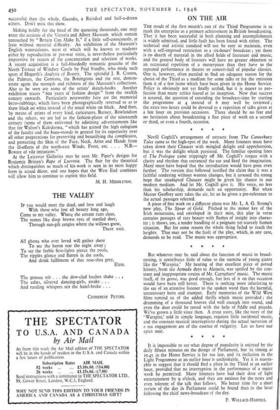ON THE AIR THE result of the first month's run
of the Third Programme is to mark the enterprise as a primary achievement in British broadcasting. That it has been successful in both planning and accomplishment is widely admitted, and little fault has been found with either. The technical and artistic standard will not be easy to maintain, even with a self-imposed restriction to a six-hours' broadcast ; yet there is no dearth of material in the allied fields of literature and music, and the general body of listeners will have no greater objection to an occasional repetition of a masterpiece than they have to the repeated performance in theatre or concert-hall of popular classics. One is, however, often puzzled to find an adequate reason for the choice of the Third as a medium for some talks or for the omission from it of a few items which have been given in the Home Service, Policy is obviously not yet finally settled, but it is nearer to per- fection than many critics feared at its inception. Now that success is assured, the question of extending the broadcast-time by starting the programme at 4 instead of 6 may well be reviewed ; the extra two hours could be devoted to a repetition of talks given at a late hour on previous occasions. There should be no fear and no hesitation about broadcasting a fine piece of work on a second or third, or even a fourth, occasion.
* * * Nevill Coghill's arrangement of extracts from The Canterbury Tales came as the high-spot of the week. Many listeners must have taken down their Chaucer with mingled delight and apprehension, but it was the delight which persisted. The familiar opening lines of The Prologue came trippingly off Mr. Coghill's tongue with a clarity and rhythm that entranced the ear and fired the imagination. Many must have hoped that the introduction would have gone even further. The version that followed justified the claim that it was a faithful rendering without wanton changes, but it aroused the strong hope that unadapted Chaucer might be given his chance in our modern medium. And let Mr. Coghill give it. His voice, no less than his scholarship, demands such an opportunity. But when Master Geoffrey next takes the air, let us be given a pre-reference to the actual passages selected.
A piece of fine work on a different plane was Mr. L. A. G. Strong's new play, The Spear of Gold. Pitched in the minor key of the Irish mountains, and enveloped in their mist, this play in verse contains passages of rare beauty with flashes of insight into charac- ter ; it shows, too, a tender handling of a poignant yet scarcely human situation. But for some reason the whole thing failed to reach the heights. That may not be the fault of the play, which, in any case, demands to be read. The music was appropriate.
But whatever may be said about the function of music in broad- casting, it contributes little of value to the stamina of young giants like the Warspite.' My hearing of that excellent piece of potted history, from the Armada days to Alamein, was spoiled by the con- stant and inappropriate strains of Mr. Carruthers' music. The music itself, of its genre, was good enough, but less of it on that occasion would have been still better. There is nothing more infuriating to the ear of an attentive listener to the spoken word than the harmful, unnecessary horn and trumpet. Early memories of the Wild West films remind us of the added thrills which music provided ; the drumming of a thousand hooves slid well enough into sound, and even the dust could be tasted with the help of fiddle and piccolo. We've grown a little since then. A great story, like the story of the
Warspite,' told in simple language, requires little incidental music, and the constant musical interruptions during the actual narration of a sea engagement are of the essence of vulgarity. Let us have our epics neat.
It is impossible to say what degree of popularity is enjoyed by the daily fifteen minutes on the doings of Parliament, but its timing at 10.45 in the Home Service is far too late, and its inclusion in the Light Programme at an earlier hour is unthinkable. Yet it is reason- able to suggest that it should find a place in the Third at an earlier hour, provided that no interruption in the performance of a major work be permitted. Many listeners have had their dose of light entertainment by 9 o'clock, and they are anxious for the news and even tolerant of the talk that follows. No better time for a short review of the day in Parliament could be found than in the hour following the chief news-broadcast of the day.
F. WALLACE-HADRILL.


































 Previous page
Previous page